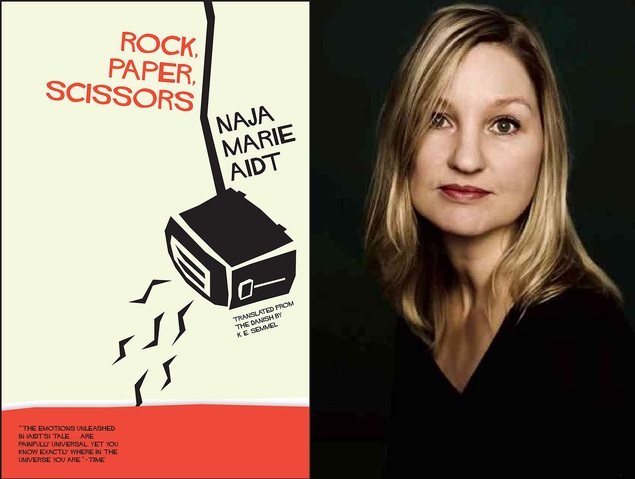See here a picture of prosperous urban life—clean, quiet, well organized, polite and considerate—now lift up the top and see the unfounded rage, the explosive violence, and the metaphysical distress bubbling just under that calm surface. This is what Danish poet and writer Naja Marie Aidt conveys to us in her latest novel, Rock, Paper, Scissors (Open Letter, 2015), translated from the Danish by K. E. Semmel.
Thomas O’Mally Lindström is a small business owner who lives in an upscale apartment with his girlfriend, Patricia. The novel begins with Thomas and his sister, Jenny, making arrangements for the funeral of their father, Jacques. We see Thomas as a man who has his life put together: he runs a successful stationary business with his partner, he’s in a relationship with an attractive, intelligent and kind woman, he is an affectionate brother to Jenny and a good uncle to her daughter, Alice. Thomas seems to have successfully left behind his poor, abusive childhood; in which he and Jenny had suffered at the hands of Jacques, a petty criminal and drug-pusher.
Things start to fall apart when Thomas, while helping his sister sort out Jacques’s things at his rundown apartment, finds a huge sum of money hidden in an old, broken toaster. Thomas decides to keep the money even though he knows his father probably came by it illegally. He hides the money in his basement; but it makes him sick with anxiety every time he thinks about it. At his father’s funeral a few days later, Thomas is surprised to find himself overcome with grief; he begins to sob uncontrollably when his sister Jenny hugs him after the service. The funeral is one among a number of great scenes—the generic service, the chapel’s “white walls, hard benches,” the tacky flowers, the awkward handshakes and nods, Jenny’s pretentious eulogy—all of it sets Thomas down a fresh spiral of panic.
The funeral is also where Thomas first meets Luke, or Luc, or The Kid. Luke is the nephew of one of Jacques’s old associates. Right from the start, there is something about Luke that bothers Thomas. He sees in him, or at least, imagines he sees, a certain sly, inveigling quality—an aura of menace obscured by Luke’s fresh, young, innocent looks. At the wake that is hosted by Luke’s uncle, Fatso, and his partner, Frank, Thomas is surprised to find out that Jacques and Luke were very close—to the extent that Jacques had been a kind of father figure to the boy—the kind that he never was to either Thomas or Jenny. Later on, a series of violent events, and Luke’s slow insinuation into Thomas’s inner circle—his burgeoning friendship with Thomas’s niece, Alice, and later on also with Patricia—pitches Thomas into a whirlpool of paranoia about who Luke really is and what he’s after. Thomas’s descent into hell is subtle, gradual—he is like a frog in a pot of water that doesn’t notice it is being boiled alive because the heat is turned up only by small increments.
Of course, Anglophone readers would not have been able to access Aidt’s Promethean novel if it wasn’t for K. E. Semmel—who has masterfully rendered Aidt’s spare, ascetic prose into English without displacing any of the dark emotions that lurk just underneath. I highly recommend Rock, Paper, Scissors—it is one of the best novels I have read in a long time. Aidt’s writing is free of superlatives and affectations; yet it is so vivid that I could picture every scene. At times, I imagined there was a projector running in my head, showing me a Lars Von Trier movie that had been Certified 90% Fresh by Rotten Tomatoes.
***
Naheed Patel is a journalist and fiction writer from India. She is currently a creative writing MFA student at Columbia University and works as an editor-at-large for Asymptote.
You can read an excerpt of Naja Marie Aidt’s Rock, Paper, Scissors from our January issue’s Danish Fiction Feature.

